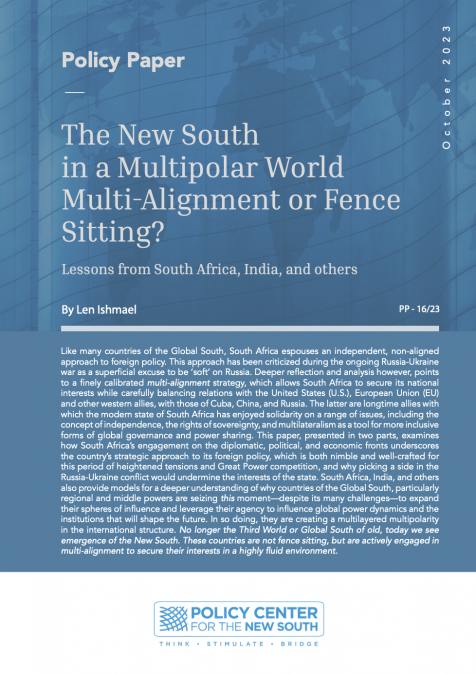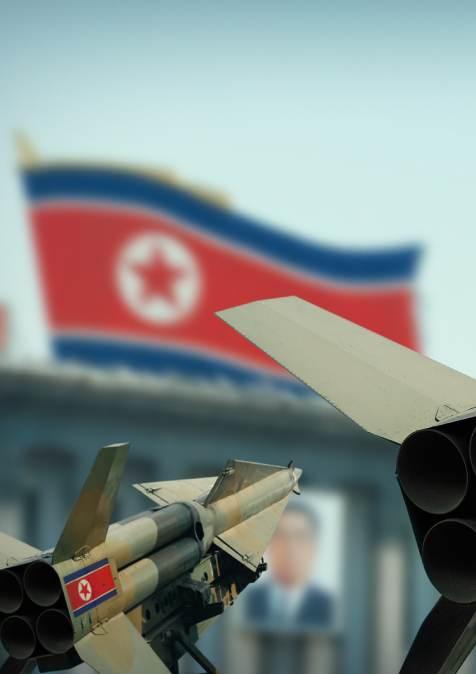Publications /
Opinion
“An Early Christmas Present to Our Adversaries”
“America retreats, chaos follows,” stated Mike Pompeo, Foreign Secretary of the United States, speaking in Egypt’s Cairo to a selected audience at the American university. “When we neglect our friends, resentment builds. And when we partner with enemies, they advance.” He knows, Pompeo was briefly in charge of the CIA. Less than twenty-four hours after the speech, including the line that “the age of self-inflicted American shame is over,” America’s troops started pulling out of Syria; in the middle of the night. Symbolism not intended (Wroughton & Masri, Reuters, 2019). Ten armored vehicles crossed the border towards Iraq, some trucks followed from a military base in Syria’s northeastern town of Rmelan. With the dust the vehicles hurled into the air, criticism followed towards Washington, praise reached the Oval Office, from Putin in Moscow, “Donald’s right,” and from another authoritarian leader in Ankara, who published his opinion in an article for the New York Times, Recep Tayyip Erdogan : “President Trump made the right call to withdraw from Syria.” Turkey, he reminded readers, has NATO’s second largest standing army, and “is the only country with the power and commitment to perform the task defeating the so called Islamic state and other terrorist groups in Syria.”
“The Defenestration of the Syrian Kurds”
On December 19, Donald Trump, President and Commander-in-Chief, inexperienced in the simplest military matters (he escaped military duty in Vietnam by producing a medical document asserting problems with bones in his feet) had announced, on Twitter, that he would pull the remaining 2,000 American soldiers out of Syria, and, [that] within 30 days, the US involvement would come to an end.
Chaos followed as predicted by Pompeo. Only at a different site, in Washington. Jim Mattis, the Secretary of Defense, a retired four-star general, resigned, since he had tried to change the President’s mind, failed, and wrote Donald Trump a letter stating that he was entitled to work with a defense secretary whose views were “better aligned with yours.”
The President seems ready to sacrifice the Syrian Kurdish allies of the People’s Protection Units (YPG), who had fought gallantly with and for the US within the Syrian Democratic Forces (SDF) against the radical Islamic State. Apparently, Trump, supposedly, encouraged Erdogan in a phone conversation to send his troops across the border, occupy Syrian territory and fill the void. The Kurds? In his opinion piece for the New York Times, Erdogan placed them under “other terrorist groups.” No doubt for Steven Simon, visiting professor of history at Amherst, former advisor on the National Security Council in the Clinton and Obama administrations, that “cold strategic logic” was eventually going to “dictate the defenestration of the Syrian Kurds.”
“One of These Failed Generals”
Trump, who, instead of golfing in Palm Beach (because of the government shut down due to a budget battle involving funds for the US/Mexico wall) remained in the White House and followed the influential Sunday morning news shows, one of his favorite pastimes. One of the participants, retired general Stanley A. McChrystal, who commanded American troops in Afghanistan (2009 to 2010), warned that leaving Syria would effectively give up any American leverage over the war there. As McChrystal states,“if you pull American influence out, you are likely to have greater instability and of course it will be much more difficult for the United States to try to push events in any direction.”
Trump reacted to the criticism of the highly decorated veteran by treating him as “one of these failed generals,” a man with “a big, dumb mouth” and as “Hillary lover.” The decision to not only pull all 2000 GIs out of the Middle East region, but reduce the 14,000 US troops active in Afghanistan by 50 percent, “went against the top advisers, blindsided our allies, and congress, and delivered an early Christmas present to our adversaries from Russia and Iran to Hezbollah and the Taliban,” criticized Susan E. Rice, national security advisor to President Barack Obama and United States ambassador to the United Nations.
“The cost of this chaos is enormous, starting with the blunt, unnerving resignation of Defense Secretary Jim Mattis,” stated Rice in the New York Times op-ed, adding “one of the last senior administration officials committed to preserving American global leadership and alliances.”
Mattis helped persuade Mr. Trump not to pull out of NATO (although the President keeps talking about it in private) and worked to assure Europe that the US remained committed to a common defense of the continent (The Editorial Board, New York Times, 2018). In his resignation letter, Mattis reminded Trump that the US was “the indispensable nation in the free world” and “our strength as a nation is inextricably linked to the strength of our unique and comprehensive system of alliances and partnerships.” Although the general could not prevent it, he helped to delay the abrogation of the Iran nuclear deal. Mattis was unable to stop Trump’s decision in upending decades of Middle East policy by moving the American embassy in Israel to Jerusalem without gaining any ground towards peace. On the contrary, Iran-backed Hamas has not been stopped in firing rockets into Israel’s towns and villages. And in the first two years, the Trump administration has not shown any progress in Palestinian /Israeli peace initiatives, promised by Trump’s son-in-law, who may be too busy in dealing with his own entanglement in the so called Russia connection.
A Profoundly Changed Situation
Trump did--not only--not inform congress about his decision, the President “who gleefully flaunts his instability and thirst for disorder every day” (Michael Tomasky, New York Times, 2018), didn’t inform close allies like Britain and France about his impulsive decision neither, and more than 70 other involved coalition members, active in the ISIS battle, were reading the end of the mission in their local newspapers. Brett McGurk, special presidential envoy for the Global Coalition resigned in protest.
Emmanuel Macron, the French President, whose police these days battles the “Yellow vests” in the streets in ever growing numbers and violence, declared “an ally must be dependable.” His defense minister, Florence Parly, deplored that its forces were engaged over Syria “in the frame work of a coalition, which is led by the Americans, trying to eliminate the remaining Islamic State forces in Iraq and Syria.”
“But now it is evident” that Mr. Trump’s decision to withdraw from Syria “profoundly changes the situation” the Defense Secretary told RTL radio. This is a “morning of alarm,” Carl Bildt, the former Swedish Prime Minister, said on Twitter. Mr. Mattis was seen as “the last strong bond across the Atlantic in the Trump administration," since “all the others are fragile at best or broken at worst.”
The High Priest of the Church has gone
The hidden, at times openly expressed, fear that Trump is even willing to abandon the NATO alliance, is once again making headlines or force political scientists and the global think tank communities to reassess the reliability of Washington under Trump’s erratic, impulsive leadership. For Francois Heisbourg, a former French defense official, the Mattis resignation was a landmark moment of an American President under fire, in open opposition to his intelligence and military structures, acting with “utter disregard for traditional US allies in his sudden decision to pull troops out of Syria and Afghanistan” (Erlanger & Perez, New York Times, 2018).
Trump, who claimed for himself “I could have been a good general,” did not inform his Asian allies on the drawdown of troops either. “Now everyone has to work on the assumption,” stated Francois Heisbourg, “that the alliance system is no longer there.” The organizations are there, the treaties are there, the troops and equipment are still there, “but the high priest of that church is gone.” In a tweet (where else ?), Trump had declared ISIS was defeated in Syria, “my only reason for being there during the Trump presidency.”
When retired generals, and even congressional allies, disagreed publicly with the President's assessment, the Commander-in-Chief corrected his declaration to “almost defeated.” And “mostly gone.” Or “largely defeated.” And, in case you did not understand the Presidential message, Trump repeated, “we are slowly sending our troops back home to be with their families, while at the same time fighting ISIS remnants.” He promised one of his trusted, but upset and irritated allies, Senator Lindsey Graham (whom he invited to lunch into the White House), that he ordered a “pause” in pulling out troops, and, “by the way, I never gave the order to rush the retreat.”
When the President visited US troops for the Christmas period, four hours in total on the ground of the Al Assad Air Base in Iraq, he declared: “We are no longer the suckers, folks. Our presence in Syria was not open ended, and it was never intended to be permanent. Eight years ago, we went there for three months, and we never left.” In the second week of January, in Cairo, Pompeo insisted in his speech: “Let me be clear: America will not retreat until the terror fight is over.”
“Now We Do It Differently”
America’s commanders in Syria requested an extension of six months; the time needed to dislocate and defeat an estimated 2,500 Islamic State fighters entrenched on a 20-mile area in the Southeastern region of Syria, around towns like Hajin in the Deir al–Zour province. Trump refused any extension. His strategy was not built on hope anymore, “hope, hope,” he said, “another six months. I have given you many six months, now we do it differently.” His way. The Islamic State remnants seem to mock the President’s wisdom--during the last weeks, a suicide bomber killed 19, including two US soldiers and two military contractors in the Syrian town of Manbij, and then hit again, five Kurds blown up and two American soldiers wounded. In 2014, the Islamic State still dominated an area in Iraq and Syria the size of Britain, now the Caliphate seems reduced to an illusion, although tens of thousands ISIS fighters remain throughout Syria and Iraq. Many militants melted back into the population, they can re-emerge, as was the case in Iraq once the US troops retreated in 2011.
The ISIS safe havens in Iraq and Syria hardly exist anymore, yet it’s global enterprise of almost two dozen branches and networks, each numbering in the hundreds to thousands of members, “remain robust,” believes Russell Travers, acting head of the National Counterterrorism Center, ISIS remains an adaptive and dangerous adversary, and is “already tailoring its strategy to sustain operations amid mounting losses” (Schmitt, New York Times, 2018). In fact, the number of foreign fighters pouring into Iraq and Syria with a rate of 1,500 per month a few years ago, has dropped sharply, according to the Institute for the Study of War in Washington, to about 100, but “on its current trajectory, ISIS could regain sufficient strength to mound a renewed insurgency that once again threatens to overmatch local security forces in both Iraq and Syria” (Schmitt, New York Times, 2018). Historian, Steve Simon, confirms, through his research, that a resurgence of the Islamic State is possible, particularly after the decision of Washington to leave the region. As he explains,“Its ideology still exists. The implication is that countering an ideology is somehow a military mission. Yet, the consensus of social scientists and the weight of common sense is that occupation by foreign forces induces radicalism, especially where occupation is accompanied by devastation and poverty.”
A Brotherhood of Evil
The US forces had a symbolic and military importance—Russia, Iran, Hezbollah, the Turks, ISIS could not extend their regional reach, and were, at least partly, blocked in their power-grabbing maneuvering by military might. The US Air Force, for example, registered almost 30,000 aerial attacks on ISIS while Trump had promised in his “America First” election campaign to end American engagement in foreign wars, and, in time for the next elections just 24 months away. He also has to build a wall, force North Korea into denuclearization and China into depressing economic losses. In other words: from now on, Donald Trump is not acting only as the Commander-in-Chief, but as candidate for the Office of the President. But “cutting and running from Syria benefits only militants,” argues Susan Rice. Turkey, Russia and Iran, President Bashar al Assad of Syria… For Washington, a brotherhood of evil. Didn’t John Bolton, only weeks ago, promise that Washington would remain with its troops in the region “as long as Iranian troops are outside Iranian borders, and that include Iranian proxies and militias?” Didn’t he just now, although US troops are moving equipment across the border into Iraq, again promised the US would remain until ISIS is defeated?
“Relinquishing Our Remaining Influence”
John Bolton, characterized by the New Yorker as a “warmonger,” since he proposed, so far without success, the bombing of Iran and North Korea, and got caught in Trump’s rollercoaster politics. Retreat from Syria. Defeat of ISIS: that was the message of Pompeo and Bolton delivered to Washington’s allies in Cairo, Riyadh, Ankara and Jerusalem, eleven nations altogether. If anything, the New York Times criticized, “the two officials left the administrations muddier than they found it.” Trump forces the departure of his troops, and Pompeo promised in Cairo to “expel every last Iranian boot from Syria.”
“We are abandoning our Kurdish partners,” Obama’s former National Security Advisor, Susan Rice, deplored, “we are leaving Israel alone to confront Iran and Hezbollah hostility, while relinquishing our remaining influence over the future of fractured Syria. Rice then adds, […] in abandoning the role of a responsible Commander-in-Chief, Mr. Trump today does more to undermine American national security than any foreign adversary.”
For Iran, and its ally Russia, “the departure of the United States from the region,” stated Daniel Benaim, a fellow focusing on the Middle East at the Center for American Progress, a liberal research group in Washington, “is a dream scenario. They get to tell the story that they have been telling to every actor on the ground- American friends , American foes alike—that America is no longer a reliable partner in the Middle East.”
“The withdrawal,” reported New York Times correspondent Ben Hubbard, is “just the latest instance of a broader American disengagement from the Middle East that could have lasting effects on one of the world’ s most volatile regions.”
According to the Institute for the Study of War, "Russia, Iran and Iran-backed militias, including the Lebanese-based Shiite group Hezbollah, are well positioned to seize territory in northeastern Syria, abandoned by US forces. They occupy 29 nearby positions, a further seven across the Iraq border." The last major redoubt of rebels opposed to Assad are crowded into Idlib province in northwestern Syria, neighboring Turkey. Russia may help Assad’s forces to retake that province eventually, but not without negotiating with Turkey, a declared enemy of Assad. Iran can now attempt to link Shiite partners in Iraq, Syria and Lebanon into a united front against Israel, which is already reacting towards the advances of the enemy by almost daily bombing run by its Air Force.
Key Players Are Cut Out
“It appears,” wrote Susan Rice in her New York Times Op-ed, “that the National Security adviser John Bolton rarely convenes his cabinet colleagues know in the White House as the ‘principals committee’ to review and debate the toughest issues. Instead, key players are cut out,” as done reportedly to the Chairman of the Joint Chiefs of Staff at “the final fateful meeting on Syria.”
A second culprit, seen by Mrs. Rice: the President himself. For the former National Security Advisor, he [Trump] “has dealt the death blow to effective policy making.”
“The President,” Rice insists, “couldn’t care less about facts, intelligence, military analyses, or the national interest.”
When John Bolton (for New Yorker author, Robin Wright, is “arguably the most abrasive American diplomat of the twenty first century”) finally met the shocked politicians and diplomats, questioning the abrupt decision, tried to salvage the situation, said Martin S. Indyk, a former ambassador to Israel, now at the Council of Foreign Relations, “he was unable to do so, because everyone in the region was questioning whether he was speaking for himself or for the President.”
And even if Bolton is attempting to defend or explain a position of the man occupying the Oval Office in Washington, he can never be certain whether Donald Trump did not change his mind during the night, reversing priorities. Bolton, a Yale-educated lawyer, championed the irresponsible, devastating Iraq invasion in 2013, has repeatedly urged military action in Iran and North Korea, for him "two sides of the same coin."
Before Trump appointed the self-satisfied Bolton to be his third National Security Advisor in his two first years in office, he was on record saying that talking to North Korea is “worse than a mere waste of time” and suggested, publicly, to deal with the North Korean dictator as Washington did with Libya’s Gaddafi – destruction of the nuclear inventory, violent death for the leader. Not surprising that some of the authoritarian friends of Trump, as Kim Jong-Un or Erdogan, prefer dealing with the President directly, if possible with Bolton outside the conference room. Next month he will, once again, be a Persona non grata, not really appreciated when he meets Mr. Kim again, for another summit between the two authoritarian leaders. Apparently, they cannot wait, since Trump declared his love for the other ruthless character.
“We Don’t Think the Turks Ought to Undertake Military Action”
Bolton’s public image somehow was further dented some days ago when he attempted to explain the rollercoaster diplomacy of his boss in Jerusalem and Ankara. Sure, despite his visit, Israel’s Prime minister, Benjamin Netanyahou, spoke to Trump personally by phone, a last attempt to change the mind of Donald Trump, as difficult as asking him to forget to Tweet for 24 hours. Still in Jerusalem and apparently not prepared for Erdogan’s reaction, Mr. Bolton told reporters that “we don’t think the Turks ought to undertake military action that’s not fully coordinated and agreed to by the US, at a minimum so they don’t endanger our troops.” Erdogan was not amused. In his New York Times article, he included accusations that the American-led coalition against Islamic State had carried out airstrikes in Raqqa, Syria and Mosul, Iraq that “showed little or no regard for civilian casualties,” in contrast to Turkish troops during counterterrorism operations. Bolton protested against these accusations, and Erdogan cancelled their meeting, obviously angered by Bolton’s declaration that Turkey should protect and not harm Washington’s allies, the Syrian Kurds.
“Different voices have started emerging from different segments of the Trump administration,” suggested Erdogan, who declared that an incursion into Syria “may happen at any moment after the Bolton meetings. If there are terrorists we will do what is necessary no matter where they come from.”
“A Self-Congratulatory Delusional Depiction”
The pro-government English language newspaper, Daily Sabah, accused Bolton of being part of a “soft coup against Trump on Washington, it was probably a bad idea for Bolton to go rogue and try to impose conditions on the United States withdrawal from Syria.”
“A grave mistake” added Erdogan, “it is not possible for us to swallow such a message.”
The Turks do not like ISIS, but they are not threatening Turkey’s territorial integrity, whereas an autonomous Syrian Kurdish zone does” (Carlotta Gall & Mark Landler , New York Times, 2018).
“I don’t know how you square this circle,” said Robert S. Ford, the last American ambassador to Syria, who teaches at Yale University. Turkey is a NATO partner, a major staging point for American military operations throughout the Middle East. Incirlik Air Base is located in Southern Turkey. The Kurds, many of them, particularly the Syrians, have been loyal allies of the US, and public opinion in the USA will blame Trump if the reliable Kurds are slaughtered by Erdogan’s military.
The President warned on January 13 in a Tweet, [that he] “will devastate Turkey economically if they hit Kurds.” Washington is contemplating the introduction of a 20-mile zone, separating Kurds and Turks at the border. But who is there to control neutrality? Turkey, waiting to invade and crush the Kurds, which, for four decades now are trying to create their own, independent ,nation? “We will not be deterred by any threat,” declared Ankara’ s Minister of Foreign Affairs Mevlut Cavusoglu. If ever Kurds and Turks are battling it out, predicts history professor Steven Simon, former advisor of Clinton and Obama, “they will turn another large swath of Syria into a wildlife preserve for jihadists.” A third party has to intervene if the Americans are gone, Syria’s Assad perhaps, hated by the Turks, supported by the Russians and Iran unthinkable for Washington. But, realpolitik, reality may force Trump to talk to Assad, and to Moscow. Steven Simon knows these kind of solutions would require deft diplomacy, but “unfortunately, at the moment, the United States appears incapable of that.” Listening to Pompeo’s speech in Cairo is like “listening to someone from a parallel universe,” felt Robert Malley, former Middle East coordinator for Barack Obama , “a self-congratulatory, delusional depiction of the Trump administration’s Middle East Policy.”









